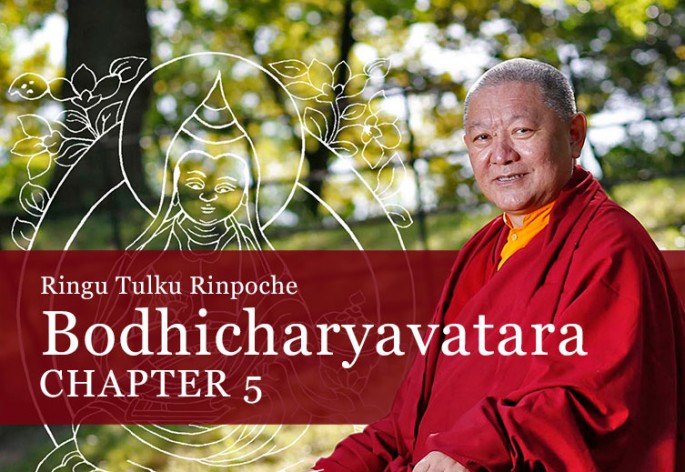BA5_9-12 How All Good Things Come From the Mind
With BA5_9-12 we come to the second point of this section: how every good thing and all virtue also come from the mind. The first three paramitas — giving, discipline and patience — are discussed here as Rinpoche explains stanzas from 9 to 12 of the fifth chapter of the Bodhicharyavatara.
To view the video, simply click on the image to view all the Chapter 5 videos.
If you prefer listening to the teaching in audio, use the audio player below.
The audio as well as the audio translations in different languages and the transcript of this teaching are all available on Chapter 5 page.
We are also studying the commentary transcript on Chapter 5, which you can download here and in the Library section. Further recommended reading: the commentary book by Kunzang Pelden (Khenpo Kunpal), The Nectar of Manjushri’s Speech, p. 168-169.
You’re questions are most welcome. Please log in and leave your questions for Rinpoche as a comment below, or send them via email to studyquestions[at]bodhicharya.org. It is helpful if you can use one short paragraph and, if possible, less than 80 words. Any questions longer than that may have to be edited so please be concise. Questions will be collected from here on Friday, May 4, 2012, and included in Rinpoche’s answers video. After that date please send any questions relating to this video teaching via email to studyquestions[at]bodhicharya.org.
If you would like to volunteer in making transcripts of Rinpoche’s online teachings, or in making audio translations to your own language, please email us at shedra[at]bodhicharya.org.
If you would like to make a personal offering to Rinpoche along with a message, please use the button below:
You can find out more about how to support the archive, while gaining access to Rinpoche's online teachings, using the button below.

dear Rinpoche, I do not quite understand why it is that maintaining a patient state of mind prevents the arising of anger. I can see that impatience can be one cause of anger, but we get angry for many different reasons eg being criticised or attacked. Could you kindly explain a bit more about the connection between patience and anger?
thank you
Lynda
Thank you very much, Rinpoche, this is such a beautiful teaching on the first three of the six Paramitas, which are a state of or are coming from the (transcended) mind. Today I was lucky to listen again, and now really understood in a deeper why, what it means and how it relates to the stanzas in the book. Going beyond attachment and aversion, just be or do it…So many great Lamas give the right example, like here in Holland dear Lama Gawang who now gives the best teachings possible…on his eldery age…I was very happy with the explanation on Phowa he recently gave in Hantum…and the excercise and he is a wonderful example of transcendance and accomplishment of the 6 Paramitas. With best wishes, also for Uncle and our whole family, prayers, marlou